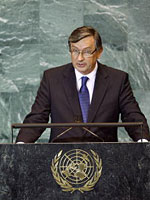Slovenia
H. E. Mr. Danilo Türk,
President
24 September 2008
- Video: English [RealPlayer - 15 min]
- Statement: English [PDF]
- Back to the list of speakers
Statement Summary

© UN Photo
Click for caption and to enlarge
Transformation was designated as a key policymaking requirement for future United Nations action, said DANILO TÜRK, President of Slovenia, who stressed that in the 60 years since the Member States adopted the Universal Declaration of Human Rights, the Organization had acted to “transform” the field in worldwide advancement of human rights, and democracy had made global progress.
However, he added that human rights violations persist in the form of racial discrimination, torture and continued conflicts, alongside new challenges such as security and counter-terrorism concerns, which seemed to have led to diminished care for fundamental freedoms in some societies. To combat this, higher priority should be given to human rights education, as well as to the work of the International Criminal Court, and the principle of the “responsibility to protect”.
The intrinsic link between the pursuits of freedom and development had been recognized in 1986, with the Assembly’s adoption of the Declaration on the Right to Development, and relevant progress has been made in subsequent years. Global development would depend heavily on the preservation of the environment, where “the battle for our common, global future will be won –- or lost.” A plan to reduce greenhouse gases had been adopted by the European Union, earlier this year, but additional “transformational” approaches were necessary, such as the establishment of adequate partnerships between key economic and political players, including the European Union, the United States and the “Group of 77” developing countries and China.
Mr. Türk recognized the contributions of the United Nations in peacekeeping, post-conflict peacebuilding, preventative diplomacy, and the strengthening of the role of the Secretary-General in those areas. But he also cited a “serious need for transformation” in the overall field of international security. Further efforts needed were strategic development of partnerships, particularly in the Middle East, the Caucasus, the Balkans and several regions of Africa. Further, reform of the Security Council had been “long overdue”. In particular, he called for: an addition of six permanent members from all regions of the world; an additional category of six non-permanent members with more frequency in rotation; and more geographic distribution given to the remaining eight non-permanent members.
[Source: GA/10740]